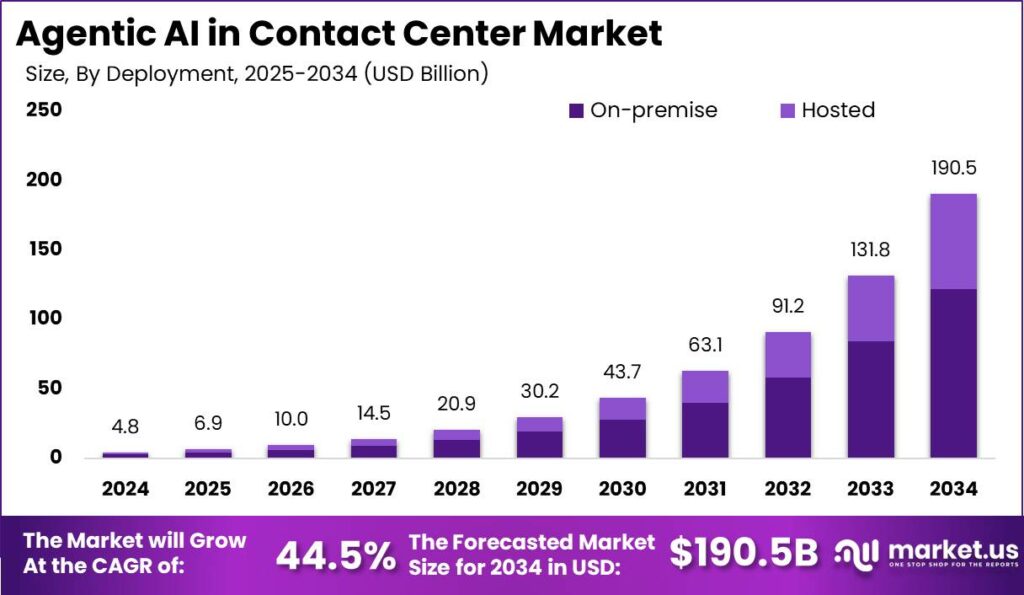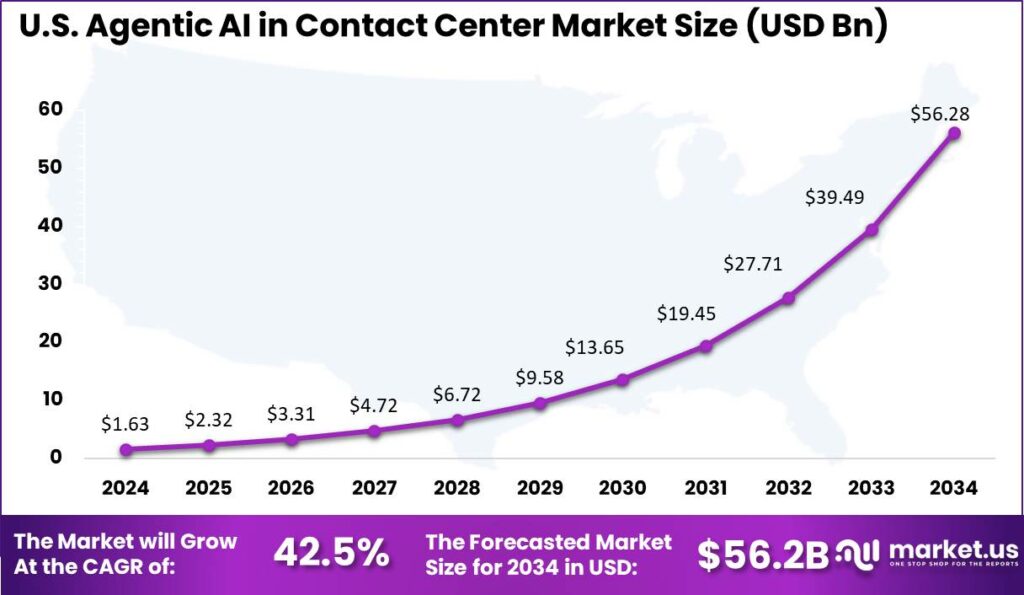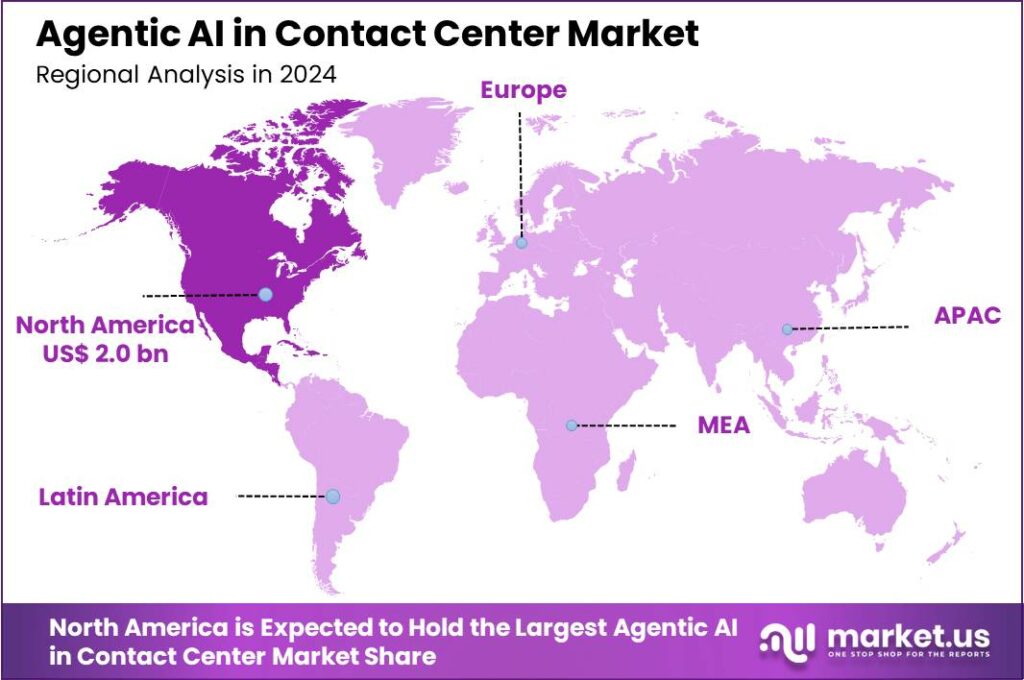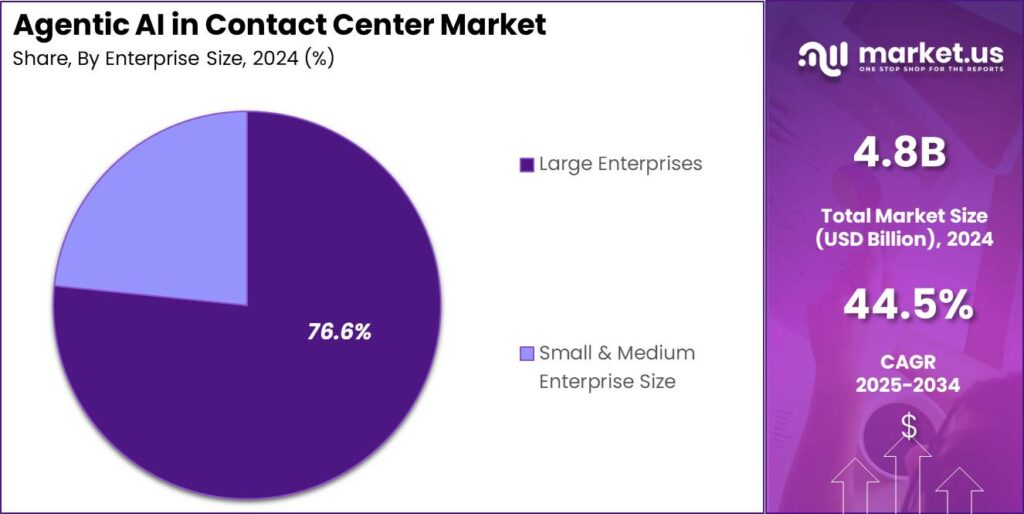Global Agentic AI in Contact Center Market Size Analysis Report By Offering (Solution (Automatic Call Distribution (ACD), Call Recording, Computer Telephony Integration (CTI), Customer Collaboration, Dialer, Interactive Voice Responses (IVR), Reporting & Analytics, Workforce Optimization, Others), Service (Professional Services (Integration & Deployment, Support & Maintenance, Training & Consulting), Managed Services), By Deployment (Hosted, On-premise), By Enterprise Size (Large Enterprise, Small & Medium Enterprise), By Technology (Machine Learning (ML), Reinforcement Learning (RL), Deep Learning (DL), Natural Language Processing (NLP), Computer Vision, Others), By End Use (BFSI, Consumer Goods & Retail, Government, Healthcare, IT & Telecom, Travel & Hospitality, Others), Region and Companies - Industry Segment Outlook, Market Assessment, Competition Scenario, Trends and Forecast 2025-2034
- Published date: Feb. 2025
- Report ID: 139550
- Number of Pages: 291
- Format:
-
keyboard_arrow_up
Quick Navigation
- Report Overview
- Key Takeaways
- U.S. Market Growth Analysis
- Analysts’ Viewpoint
- Offering Analysis
- Deployment Analysis
- Enterprise Size Analysis
- Technology Analysis
- Key Market Segments
- Driver
- Restraint
- Opportunity
- Challenge
- Growth Factors
- Emerging Trends
- Business Benefits
- Key Regions and Countries
- Key Player Analysis
- Recent Developments
- Report Scope
Report Overview
The Agentic AI in Contact Center Market size is expected to be worth around USD 190.5 Billion By 2034, from USD 4.8 billion in 2024, growing at a CAGR of 44.5% during the forecast period from 2025 to 2034. In 2024, North America held a dominant market position, capturing more than a 42.7% share, holding USD 2.0 Billion revenue.
The market for agentic AI in contact centers is rapidly expanding, driven by the technology’s ability to significantly enhance customer experience and operational efficiency. Major players in technology and customer experience sectors, such as Microsoft and Salesforce, are heavily investing in agentic AI, demonstrating the market’s confidence in its transformative potential.
The primary driving factors behind the adoption of agentic AI in contact centers include the need to manage large volumes of customer interactions efficiently and the demand for enhanced customer service. Agentic AI systems address these needs by automating routine tasks, such as handling common inquiries and managing customer data, which allows human agents to focus on more complex and sensitive interactions.
Key Takeaways
- The Agentic AI in Contact Center Market is projected to witness exponential growth, reaching approximately USD 190.5 billion by 2034, up from USD 4.8 billion in 2024. This expansion is driven by a remarkable CAGR of 44.5% from 2025 to 2034, signaling rapid adoption across industries.
- North America dominated the market in 2024, holding a 42.7% share with revenues exceeding USD 2.0 billion.
- The United States has emerged as a key player, with its market size reaching USD 14.63 billion in 2024, supported by a CAGR of 42.5%.
- The On-premise segment maintained its leading position in 2024, accounting for 64.2% of the market share. Enterprises continue to prefer on-premise AI solutions due to data security concerns and customization capabilities.
- Large Enterprises played a dominant role, securing 76.6% of the market share in 2024. The need for scalable AI-driven customer service has driven adoption among multinational corporations.
- The Natural Language Processing (NLP) segment stood out as the top technology, holding 32.8% of the total market share in 2024. NLP advancements have significantly improved customer interactions, automation, and sentiment analysis.
U.S. Market Growth Analysis
The U.S. market for Agentic AI in contact centers has shown substantial growth, as evidenced by a market size of USD 14.63 billion in 2024 and an impressive compound annual growth rate (CAGR) of 42.5%. This robust expansion can be attributed to several key factors that position the U.S. as a leader in this technology sector.
Firstly, the United States boasts a well-established technological infrastructure and a dynamic ecosystem that fosters innovation, particularly in AI technologies. Home to many of the world’s leading tech firms and research institutions, the U.S. provides a fertile ground for substantial research and development in AI. These entities are pivotal in driving the advancements in Agentic AI that streamline operations and enhance service delivery in contact centers.
Moreover, the U.S. benefits from strong governmental support and favorable regulatory environments that encourage the adoption and integration of AI technologies across various sectors. This is complemented by significant investment from both public and private sectors, aimed at pushing the boundaries of what AI can achieve in business applications. Venture capital investments in AI startups are notably high in the region, further accelerating innovation and the commercialization of new AI technologies.

In 2024, North America established itself as a leader in the Agentic AI in Contact Center market, capturing a significant market share of 42.7% and generating revenues of approximately USD 2.0 billion. This dominant position can be attributed to several key factors that uniquely position North America at the forefront of this technological advancement.
Firstly, North America benefits from a highly developed technological infrastructure, which is complemented by a strong ecosystem of innovation. The region is home to numerous leading technology firms and research institutions that drive significant advancements in AI technologies. This environment fosters extensive research and development activities, leading to the creation of cutting-edge Agentic AI solutions.
The presence of these firms not only stimulates innovation but also facilitates the rapid commercialization of new technologies. Additionally, the market in North America is bolstered by robust governmental support and favorable regulatory frameworks that encourage the adoption and integration of AI technologies across various sectors. This supportive environment is critical as it provides a stable platform for growth and development within the Agentic AI sector.
Furthermore, there is substantial investment, both public and private, which propels further advancements and adoption of Agentic AI technologies. For instance, venture capital funding for AI startups is notably high in the region, which accelerates innovation and supports the broader deployment of AI solutions.

Analysts’ Viewpoint
The market demand for agentic AI in contact centers is growing as businesses seek to improve customer satisfaction and engagement while reducing operational costs. The ability of agentic AI to provide 24/7 customer support and proactively address service issues before they escalate is particularly appealing.
According to Market.us, The Global AI in Contact Center Market is projected to grow significantly, reaching approximately USD 12.1 billion by 2033, up from USD 1.9 billion in 2023. This expansion represents a CAGR of 20.4% from 2024 to 2033, driven by the increasing demand for AI-driven customer service solutions.
The integration of agentic AI into contact centers offers substantial investment opportunities, primarily due to its potential to significantly enhance operational efficiencies and customer experience. Forecasts indicate that agentic AI could contribute between $2.6 trillion and $4.4 trillion annually to global GDP by 2030, underscoring its economic impact across various sectors.
Agentic AI’s impact on technology within contact centers revolves around its ability to automate complex tasks and provide decision-making support in real-time. This AI is not just about handling routine queries but also about enhancing the agents’ role by equipping them with insights and tools to improve their efficiency and effectiveness.
The deployment of agentic AI in contact centers also brings to light various regulatory considerations. There is a pressing need for frameworks that address privacy, data protection, and AI ethics to prevent biases and ensure fairness in automated decisions. Legislators and companies must work together to create standards and regulations that foster innovation while protecting consumer rights and promoting trust in AI technologies.
Offering Analysis
In 2024, the Solution segment held a dominant market position within the agentic AI in the contact center market, capturing more than an 80.5% share. This segment’s substantial market share can be attributed primarily to the increasing demand for automated customer service solutions that enhance operational efficiency and improve customer satisfaction.
Solutions such as Automatic Call Distribution (ACD), Interactive Voice Responses (IVR), and Dialers have become integral to managing high volumes of customer interactions effectively, driving their adoption across various industries. The robust growth of the Solution segment is also supported by significant advancements in AI and machine learning technologies.
These innovations have allowed contact centers to implement more sophisticated tools like Computer Telephony Integration (CTI) and Workforce Optimization. Such technologies not only streamline communication processes but also provide detailed analytics and reporting that help in strategic decision-making and long-term planning. The ability to integrate with existing infrastructures and provide seamless customer experiences further propels the demand for these solutions.
Moreover, the ongoing digital transformation initiatives across sectors have compelled organizations to prioritize customer engagement and retention. This shift underscores the necessity for comprehensive solutions that offer functionalities like call recording, customer collaboration, and analytics. These features enable businesses to gain insights into customer behavior, optimize agent performance, and ultimately drive sales growth, cementing the leading position of the Solution segment in the market.
In addition to the technological drivers, economic factors also play a critical role. The cost-effectiveness of implementing AI-driven solutions compared to the expense of managing large-scale human call centers is a significant advantage. Businesses are able to achieve greater scalability and flexibility in operations, which is essential in today’s dynamic market environment. This economic efficiency, combined with technological benefits, ensures that the Solution segment continues to lead the agentic AI in the contact center market.
Deployment Analysis
In 2024, the On-premise segment held a dominant market position within the agentic AI in the contact center market, capturing more than a 64.2% share. This leading position can largely be attributed to the enhanced control and security that on-premise solutions offer to organizations.
In industries where data sensitivity and compliance with stringent regulatory standards are paramount, such as healthcare, banking, and government, on-premise deployments are particularly prevalent. These sectors prioritize the on-premise model to ensure that all customer interactions and data remain securely housed within their own IT infrastructures.
Another factor contributing to the dominance of the on-premise segment is the reliability it offers. Unlike hosted solutions, on-premise systems do not depend heavily on internet connectivity. This independence from the web ensures that businesses can maintain uninterrupted service and stability, which is crucial for industries operating in regions with unreliable internet service.
Moreover, on-premise solutions allow companies to have full control over the customization and integration of their systems with other internal technologies, which can be tailored to specific operational needs without relying on third-party providers.
Furthermore, despite the initial capital investment and maintenance costs associated with on-premise solutions, many businesses see this as a long-term investment in securing their data and gaining a competitive edge. The ability to have full ownership of their contact center infrastructure without ongoing subscription costs can be more cost-effective for companies expecting to use the same systems extensively over many years.
The trend towards digital transformation and cloud migration has been reshaping the contact center landscape, yet the on-premise segment continues to hold significant ground. This endurance is driven by its proven track record of providing robust, secure, and reliable service, which remains a critical deciding factor for many enterprises today.
Enterprise Size Analysis
In 2024, the Large Enterprise segment held a dominant market position in the Agentic AI in Contact Center Market, capturing more than a 76.6% share. This commanding presence can be primarily attributed to the substantial resources and capital that large enterprises can allocate towards integrating advanced AI technologies to enhance their customer service operations.
Large organizations often deal with a massive volume of customer interactions across various channels, necessitating robust systems that can automate responses, analyze customer feedback, and streamline communication processes efficiently. Moreover, large enterprises typically have more complex and demanding customer service requirements that benefit significantly from the customization and scalability offered by agentic AI solutions.
These solutions enable them to maintain a competitive edge by optimizing customer interaction strategies and improving overall customer satisfaction. The ability to deploy sophisticated AI tools such as machine learning models, natural language processing, and predictive analytics allows these enterprises to not only handle large volumes of data but also derive actionable insights that can lead to improved service delivery.
Additionally, large enterprises are more likely to invest in comprehensive AI-driven platforms that include advanced analytics, reporting capabilities, and workforce optimization tools. These platforms help large organizations to manage their customer service operations more effectively, reducing costs, and improving operational efficiency.
The ongoing digital transformation initiatives within large enterprises also drive the adoption of such technologies, as they seek to innovate and improve their customer interaction systems in response to evolving consumer expectations and market conditions.

Technology Analysis
In 2024, the Natural Language Processing (NLP) segment held a dominant market position in the Agentic AI in Contact Center Market, capturing more than a 32.8% share. This significant market share can be attributed to the essential role NLP plays in enhancing the capabilities of AI systems within contact centers, enabling them to understand and process human language in a way that improves customer interaction quality and efficiency.
NLP technologies are crucial for developing more intuitive and effective communication tools such as chatbots and virtual customer assistants. These tools use NLP to interpret and respond to customer inquiries in real time, providing responses that are contextually relevant and linguistically accurate. This capability not only improves the customer experience by offering quick and accurate responses but also reduces the workload on human agents by handling routine inquiries autonomously.
Furthermore, the integration of NLP with other AI technologies like machine learning enhances its ability to learn from interactions and improve over time, making it invaluable for contact centers looking to continuously enhance their service quality. The technology’s ability to analyze sentiment and extract insights from customer interactions also allows businesses to better understand customer needs and tailor their services accordingly.
The continued evolution of NLP and its increasing sophistication in processing complex language constructs and slang ensure its ongoing dominance in the contact center AI market. This trend is supported by the growing demand for more human-like and effective automated customer service solutions across industries, driving further developments and adoption of NLP technologies.
Key Market Segments
By Offering
- Solution
- Automatic Call Distribution (ACD)
- Call Recording
- Computer Telephony Integration (CTI)
- Customer Collaboration
- Dialer
- Interactive Voice Responses (IVR)
- Reporting & Analytics
- Workforce Optimization
- Others
- Service
- Professional Services
- Integration & Deployment
- Support & Maintenance
- Training & Consulting
- Managed Services
- Professional Services
By Deployment
- Hosted
- On-premise
By Enterprise Size
- Large Enterprise
- Small & Medium Enterprise
By Technology
- Machine Learning (ML)
- Reinforcement Learning (RL)
- Deep Learning (DL)
- Natural Language Processing (NLP)
- Computer Vision
- Others
By End Use
- BFSI
- Consumer Goods & Retail
- Government
- Healthcare
- IT & Telecom
- Travel & Hospitality
- Others
Driver
Enhanced Operational Efficiency and Cost Reduction
The integration of agentic AI into contact centers is primarily driven by its ability to enhance operational efficiency and reduce costs. This technology empowers contact centers by automating routine tasks such as call routing, data retrieval, and basic customer inquiries, which significantly reduces the workload on human agents. By handling these repetitive tasks, agentic AI allows human agents to focus on more complex and high-value interactions that require human empathy and creative problem-solving skills.
This shift not only improves the speed and quality of customer service but also ensures that enterprises can scale their customer support efforts without a corresponding increase in operational costs. This transformation is essential in today’s experience-driven economy where efficiency and customer satisfaction are paramount.
Restraint
Security and Privacy Concerns
A significant restraint in the adoption of agentic AI within contact centers is the concern regarding security and privacy. As these AI systems process a vast amount of personal and sensitive data, there is a heightened risk of data breaches and privacy violations. Ensuring compliance with stringent regulations such as GDPR and HIPAA is crucial.
Moreover, the complexity of securely integrating agentic AI with existing IT infrastructure poses a challenge. These security concerns necessitate substantial investments in cybersecurity measures and robust data management policies to safeguard customer information, which can delay or deter the implementation of agentic AI technologies in contact centers.
Opportunity
Personalization and Customer Satisfaction
Agentic AI presents a significant opportunity to transform customer service through personalized and proactive customer engagement. By analyzing customer interaction data, AI can anticipate customer needs, tailor communications, and even resolve issues proactively before the customer reaches out. This level of personalization enhances customer satisfaction by making interactions more relevant and timely.
Furthermore, the ability of agentic AI to learn and adapt from each interaction allows for continuous improvement in service quality, fostering stronger customer relationships and enhancing brand loyalty. The ability to deliver a more personalized service not only meets modern customer expectations but also sets the stage for higher customer retention rates.
Challenge
Balancing Automation with Human Touch
One of the primary challenges in implementing agentic AI in contact centers is maintaining a balance between automation and the human touch. While AI is highly efficient at handling routine tasks and data processing, human agents are still crucial for managing complex issues that require empathy, nuanced understanding, and emotional intelligence.
Ensuring a seamless handover from AI to human agents, where necessary, is vital to maintain customer trust and satisfaction. Moreover, there is an ongoing need to train and adapt AI systems to handle varied customer interactions without losing the personal touch that customers value. Managing this balance requires careful planning and continuous refinement of AI capabilities to ensure that the technology complements rather than replaces the human element of customer service.
Growth Factors
Agentic AI in contact centers is experiencing significant growth due to its ability to improve operational efficiencies and customer engagement. This technology enhances decision-making by analyzing interactions in real-time, leading to more accurate and timely responses to customer needs.
It also supports 24/7 customer service operations without the need for continuous human intervention, making it highly valuable in global markets where customer engagement can happen around the clock. The ability of agentic AI to learn and adapt through interactions ensures that it becomes more effective over time.
This continuous improvement is crucial for maintaining high service standards and adapting to changing consumer behaviors and expectations. Furthermore, agentic AI’s capacity to handle multimodal interactions seamlessly across various communication channels, such as phone, chat, and email, significantly enhances the customer experience by providing a cohesive service journey.
Emerging Trends
One of the most prominent trends in the deployment of agentic AI within contact centers is its increasing use in automating complex customer service processes. This includes not just basic query resolution but also intricate customer interactions that require dynamic decision-making.
The integration of advanced natural language processing capabilities allows AI to handle a broader range of customer emotions and queries with greater sensitivity and accuracy. Another emerging trend is the strategic use of agentic AI to analyze large data sets to predict customer behavior and tailor services accordingly.
This predictive capability is transforming how companies approach customer service, moving from reactive to proactive service delivery. Additionally, there is a growing emphasis on creating AI that can work collaboratively with human agents, enhancing rather than replacing the human touch.
Business Benefits
The deployment of agentic AI in contact centers offers numerous business benefits, including significant cost reductions and enhanced customer satisfaction. By automating routine tasks, agentic AI frees up human agents to focus on more complex and value-added activities, thus optimizing labor costs and enhancing employee satisfaction.
Moreover, the precision and efficiency provided by AI lead to faster problem resolution, which directly contributes to higher customer satisfaction levels. Furthermore, the ability to provide personalized customer service through AI-driven insights helps in building stronger customer relationships and loyalty.
Agentic AI’s capability to personalize interactions based on individual customer data ensures that the service is not only efficient but also resonates more deeply with customers, thereby enhancing overall customer engagement and retention.
Key Regions and Countries
- North America
- US
- Canada
- Europe
- Germany
- France
- The UK
- Spain
- Italy
- Rest of Europe
- Asia Pacific
- China
- Japan
- South Korea
- India
- Australia
- Singapore
- Rest of Asia Pacific
- Latin America
- Brazil
- Mexico
- Rest of Latin America
- Middle East & Africa
- South Africa
- Saudi Arabia
- UAE
- Rest of MEA
Key Player Analysis
Microsoft has been a leader in the Agentic AI space with its Azure AI platform. The company has focused on integrating cognitive tools, machine learning, and predictive models to enhance customer interactions. In recent years, Microsoft has made strategic acquisitions, such as Nuance Communications, to strengthen its AI-driven customer engagement solutions.
Google’s Contact Center AI (CCAI) is a flagship product in this market, built on Dialogflow CX for conversational AI. Google has consistently expanded its offerings through updates and integrations with its cloud ecosystem. The company has also introduced advanced call analysis tools that provide actionable insights for improving customer experience.
Cognigy is another prominent player revolutionizing contact centers with its Agentic AI solutions. The company focuses on hyper-personalization, seamless collaboration between AI and human agents, and autonomous decision-making.
Top Key Players in the Market
- NICE Ltd.
- Genesys Cloud Services Inc.
- Five9 Inc.
- Cognigy GmbH
- UiPath Inc.
- Talkdesk
- Microsoft Corporation
- Amazon Web Services Inc.
- Google LLC
- Oracle Corporation
- Others
Recent Developments
- In January 2025, Genesys deepened its collaboration with Amazon Web Services (AWS) by integrating AWS chatbot self-service tools and live call analytics into its contact center solutions. This partnership aims to streamline workflows and enhance customer experiences.
- In December 2024, UiPath announced the acquisition of a conversational AI startup to strengthen its automation capabilities in contact centers, focusing on seamless integration between robotic process automation (RPA) and Agentic AI.
Report Scope
Report Features Description Market Value (2024) USD 4.8 Bn Forecast Revenue (2034) USD 190.5 Bn CAGR (2025-2034) 44.5% Base Year for Estimation 2024 Historic Period 2020-2023 Forecast Period 2025-2034 Report Coverage Revenue Forecast, Market Dynamics, COVID-19 Impact, Competitive Landscape, Recent Developments Segments Covered By Offering (Solution (Automatic Call Distribution (ACD), Call Recording, Computer Telephony Integration (CTI), Customer Collaboration, Dialer, Interactive Voice Responses (IVR), Reporting & Analytics, Workforce Optimization, Others), Service (Professional Services (Integration & Deployment, Support & Maintenance, Training & Consulting), Managed Services), By Deployment (Hosted, On-premise), By Enterprise Size (Large Enterprise, Small & Medium Enterprise), By Technology (Machine Learning (ML), Reinforcement Learning (RL), Deep Learning (DL), Natural Language Processing (NLP), Computer Vision, Others), By End Use (BFSI, Consumer Goods & Retail, Government, Healthcare, IT & Telecom, Travel & Hospitality, Others) Regional Analysis North America – US, Canada; Europe – Germany, France, The UK, Spain, Italy, Russia, Netherlands, Rest of Europe; Asia Pacific – China, Japan, South Korea, India, New Zealand, Singapore, Thailand, Vietnam, Rest of APAC; Latin America – Brazil, Mexico, Rest of Latin America; Middle East & Africa – South Africa, Saudi Arabia, UAE, Rest of MEA Competitive Landscape NICE Ltd., Genesys Cloud Services, Inc., Five9 Inc., Cognigy GmbH, UiPath Inc., Talkdesk, Microsoft Corporation, Amazon Web Services Inc., Google LLC, Oracle Corporation, Others Customization Scope Customization for segments, region/country-level will be provided. Moreover, additional customization can be done based on the requirements. Purchase Options We have three license to opt for: Single User License, Multi-User License (Up to 5 Users), Corporate Use License (Unlimited User and Printable PDF)  Agentic AI in Contact Center MarketPublished date: Feb. 2025add_shopping_cartBuy Now get_appDownload Sample
Agentic AI in Contact Center MarketPublished date: Feb. 2025add_shopping_cartBuy Now get_appDownload Sample -
-
- NICE Ltd.
- Genesys Cloud Services Inc.
- Five9 Inc.
- Cognigy GmbH
- UiPath Inc.
- Talkdesk
- Microsoft Corporation
- Amazon Web Services Inc.
- Google LLC
- Oracle Corporation
- Others












